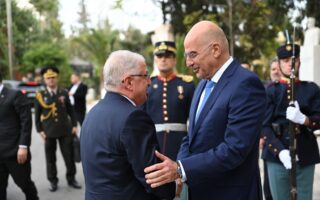Should Athens fear the US elections?

More people will be casting a vote this year than at any other time in the history of the world. Indeed, over 40% of the world’s population, representing almost 60% of global output, will go to the polls. The presidential election in the United States is, perhaps, the most crucial for the world as a whole, given what it means for the open war fronts, for alliances and power relations, and, of course, for the economy and trade.
What would the re-election of Donald Trump mean for Greece? If, of course, he is allowed to run, if polls indicating that he will prevail over President Joe Biden are confirmed and if Biden runs against him. Trump already demonstrated how he perceives American ties with the European Union in his first term by challenging the European edifice to its core. He also demonstrated his point of view on authoritarian regimes such as those in Russia and Turkey, and even in North Korea, which he treated with remarkable leniency.
Trump has shown that he means to disengage the United States from problematic fronts, with an obvious intention to withdraw from areas of special interest, such as the Middle East. To this end, the Abraham Accords were advanced, that is, the recognition of Israel by Arab states, so that there was no longer any need for American intervention in the day-to-day affairs of the region. Trump is contemptuous of international institutions, withdrawing the US from a number of treaties and pulling out of the agreement on Iran’s nuclear program.
Cooperation with Greece during the Trump administration was strengthened and consolidated, however. The groundwork for the strategic relationship and the liquified natural gas terminal in Alexandroupoli, northern Greece, was laid in 2017-2018, while the United States also participated for the first time in the Israel-Greece-Cyprus trilateral summit, from which it had discreetly withdrawn in recent years.
The good chemistry between Trump and Turkish President Recep Tayyip Erdogan and the eclectic ties between their sons-in-law did not prevent him from putting the knife to the latter’s throat over the Pastor Brunson case. And Trump may have abandoned the Kurdish fighters in Syria following a communication with his Turkish counterpart, but in the Eastern Mediterranean his staff saw Greece as the most reliable partner and did not reverse the policy of supporting our relations with Egypt and Israel for the sake of Turkey. The pro-Israel lobby, which had direct access to Trump and for which Erdogan’s Turkey was a red flag, also had a decisive contribution to this.
In Greek-Turkish relations, the former American leadership did not exert any pressure on Athens to come to terms with Ankara, nor did it show any preference for the latter. On the contrary, the then undersecretary of state, A. Wess Mitchell, and national security adviser John Bolton considered Turkey’s inclination towards Islam and its withdrawal from the West inevitable, while Mike Pompeo, then secretary of state, gave Greece an increased voice and role. When politics lacks structure, people play a catalytic role, which is why Turkey had “invested” in Michael Flynn.
Of course, most of Trump’s associates turned out to be expendable and he ignored them on several occasions, as did the State Department. However, we do know that he emphasizes projects that generate revenues for the US economy, that he is not driven by principles and values, and that he is overconfident, believing that negotiations should be treated like business deals. Under Trump, there were critical posts that were not filled and, as a result, there were gaps in how US policy was formulated and carried out. There was also an unwillingness to cooperate and consult, especially with European partners, which strained the relationship.
If far-right and populist forces in Europe become stronger before Trump’s possible re-election, the situation will automatically change, putting Athens in a difficult position
Overall, it is hard for more liberal regimes to trust Trump’s America. So if we have a new reversal in the EU-US partnership and a revision of the US policy in Ukraine, but also towards the now strengthened NATO, the impact on Greece and Turkey is self-evident. In fact, if far-right and populist forces in Europe become stronger before Trump’s possible re-election, the situation will automatically change, putting Athens in a difficult position.
In a purely Greek-American context, the established relationship of cooperation will not be challenged. The fact that this has recently acquired an economic, commercial and energy nature gives it prestige in Trump’s perspective. A stabilization or otherwise in the Middle East, the position of Israel, the dynamics in the Arab world and the energy projects in the Eastern Mediterranean will certainly affect US relations with Greece and Turkey. Ankara’s role in the light of the latest developments will be considered and enhanced in Trump’s eyes, and in the event that Congress becomes Republican-controlled, it will not stand in the way of the choices of the next occupant of the White House.
Unfettered business
In an extreme scenario, because Turks feel anxious when they don’t have military superiority, Ankara would try to bring up the F-35 issue again with a president who doesn’t set rules and conditions when it comes to doing business. A necessary note here is that the Republican Party does not have a strong opinion on Greek-Turkish disputes and their resolution, unlike the Democrats. With some expressions of goodwill on the part of Erdogan, who has found Trump’s buttons, and given that the former’s relationship with Vladimir Putin is not troublesome for the latter, Ankara is expected to be a winner, but not at the expense of Greece – unless a crisis arises, with a serious potential risk that Trump will appear (more) tolerant. After all, in the last year of his presidency, he signed the Turkey-Libya agreement, which was followed by the attempted invasion of migrants in northern Greece’s Evros region Greece and the Oruc Reis gas exploration mission, without the US reacting in any meaningful way. So there is a worrying precedent, as just a few months ago Washington publicly supported the EastMed gas pipeline as well as our partnerships with Israel.
Let’s keep in mind that by the time the next American president is sworn in, Erdogan will have developed a vision for the course of Greek-Turkish and Euro-Turkish relations, acting accordingly.
For all the above reasons, the creation of a task force is essential, which will prepare scenarios (for consequences on a global scale) and coordinate our actions, so that in cooperation with the highly effective Greek-American lobby, we can identify the “key” persons (such as the next national security advisor) to exert influence on the Trump administration, reintroduce ourselves to the Republicans and present a comprehensive plan, ensuring continued access to his inner circle.
Constantinos Filis is an associate professor at the American College of Greece and director of its Institute of Global Affairs.





